Dustdevil Diversity Spotlight: Dr. Lourdes Viloria
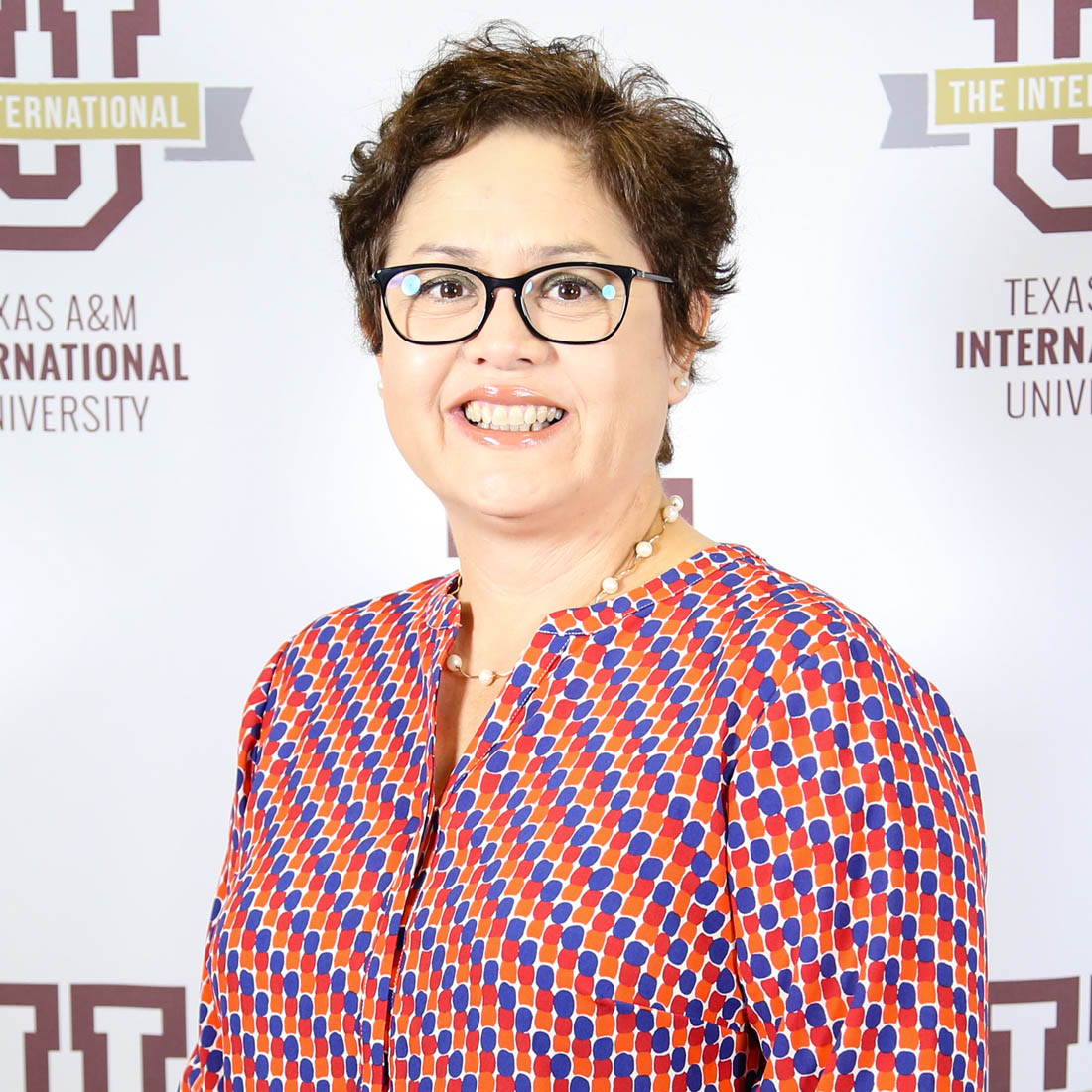
This is part of a series of interviews highlighting diversity at TAMIU. On the occasion of Hispanic Heritage Month, this interview features Dr. Lourdes Viloria, TAMIU associate professor of Education.
Sharing her Experiences with Future Generations of Hispanic Students
Tell us about yourself, where are you from and what you do here at TAMIU?
Recently, my niece, who is a pre-med student at Texas A&M University, College Station, decided to research our family ancestry. Consequently, now we know that we are third-generation Texans. According to U.S. Census records, we learned that my father’s family immigrated from Monterrey, Nuevo León, México to Rockdale, Texas in the early 1920’s. Although I knew my father had been born in Rockdale, Texas, I did not know that our family had a longer Texas history. In reality, due to family hardships, my father was raised in Monterrey, México by his grandmother, and that is where he met my mother. In contrast, on my mother’s side, I am a first-generation Mexican-American.
I am a mother, educator, and mentor. I was born and raised in Laredo and attended local public schools. As a result, I am a proud alumni and member of the first graduation class of Dr. Leo G. Cigarroa High School. For my undergraduate degree, I attended the University of Texas at Austin, where I earned a B.A. in Government. Immediately after graduation in 1989, I returned to Laredo, where I was hired as the Pro-Bono Coordinator for the Laredo Legal Aid Office. At the same time, I attended then-Laredo State University (LSU). During those fast-paced times early in my educational career, I secured a second grade teaching assignment with the Laredo Independent School District, where I worked from 1989 to 1993. As soon as I completed my second year of teaching, I enrolled at LSU and completed a Master in Educational Administration in 1993.
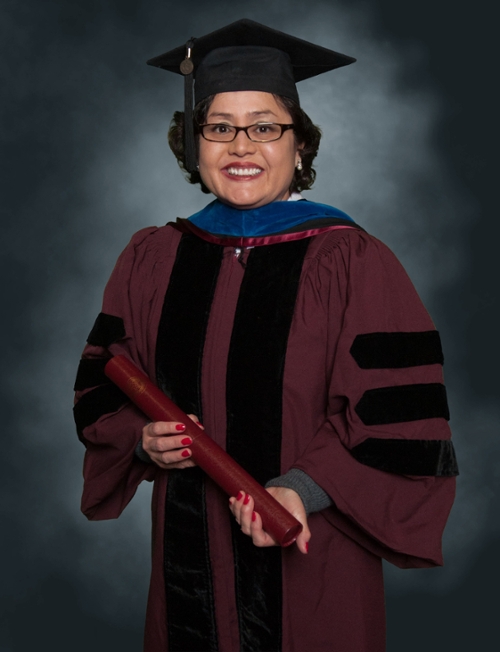
During the summer of 1993, I married my husband and we have been married for 27 years. As soon as we got married, we moved to San Antonio where I worked as a first grade and kindergarten teacher with the San Antonio Independent School District. Immediately after our son was born, we moved to Dallas, where I completed my principal practicum and was a pre-kindergarten teacher from 1995 to 1998. During the fall of 1998, I applied for an Assistant Principal position with United Independent School District (UISD). I am grateful to UISD for granting me the opportunity of securing my first leadership position at Newman Elementary where I served as an Assistant Principal until 2003. In January 2003, I was named the principal at Dr. S. Perez Elementary School in South Laredo, where I proudly served from 2003 until 2013.
In the hope that I could make additional academic contributions in my community, in 2006, I decided to pursue a terminal degree in Educational Administration so I applied at Texas A&M University in College Station and was accepted. Looking back to those years as a full-time principal and a Ph.D. student, I honestly do not know how I was able to juggle so many responsibilities. Thankfully, my husband is supportive and he would drive me to College Station for my Saturday classes every two weeks.
When did you join TAMIU?
I started working at TAMIU as an adjunct instructor in the Spring of 2013. That same year, I applied for a full-time, tenure-track position in the College of Education and was hired as an assistant professor in fall 2014.
Tell us about your experience living in Laredo.
As a Laredo native, I can share that Laredo has been developing into a very dynamic and fast-growing international hub for diverse, import-export companies. I believe that the daily commerce makes our local economy thrive. To that end, in my opinion, TAMIU is another institution that makes the Laredo economy vibrant.
Educational attainment at the University makes dreams come true. With this in mind, just think for a moment how many students are the first in their family to complete a post-secondary education. Currently, at TAMIU, where many of our students are defined as at-risk, our responsibility is to help them become at-promise students. Once they complete their post-secondary degree at TAMIU, they become successful Laredo residents and role models for their immediate family. In addition, TAMIU graduates will have a strong, positive impact on the per-capita earnings at the local, state and national levels. In reality, during its first 50 years of existence, TAMIU has positively influenced three generations of Laredo residents and the best is yet to come.
What are your research interests and how did you became interested in your area of study?
My primary research goal is to prepare educational leaders equipped with research-based, culturally responsive leadership practices and Science, Technology, Engineering and Mathematics (STEM)-based knowledge to lead in public school systems. STEM education is important to me because in 2020, there will be approximately four million STEM jobs available in the United States.
In addition, when I left Laredo and enrolled at the University of Texas, my goal was to become a Bio-Medical Engineer but in reality, soon after my first mathematics and science courses at UT, I realized that I was ill prepared to embark on a STEM field. To that end, I strongly believe the future of Hispanic students' post-secondary readiness includes a strong foundation in mathematics. Hispanic students have not fared well in STEM fields of study due to a number of inequities.
At TAMIU, I have experienced a process of formation and growth in understanding the importance of long-term collaborations between practitioners and researchers to investigate problems of practice and solutions for increasing Hispanic students' representation in all fields of study. Relatedly, I believe in cross-disciplinary collaborations because I understand the importance of place-based education as tool for participatory parity. Foundationally, I believe that as an educational administration professor, my responsibility is to pursue research inquiries that help me prepare pragmatic instructional leaders that understand the importance of leading schools that meet the educational and socio-cultural needs of diverse students, close achievement gaps, and make data-driven decisions to increase first generation Hispanic students' college and career readiness.
How do you feel your contributions impact TAMIU, the community and world around you?
My educational achievements are full of lived experiences that refine my persistence to fulfill my educational goals while simultaneously mentoring and coaching future generations of diverse students to achieve their educational goals. Therefore, I strive to contribute my intellectual knowledge and expertise to recruit, mentor and support future TAMIU students because their academic success positively influences Laredo and the future of Hispanic people.
For the past two years, I have collaborated with TAMIU's Department of Mathematics and Physics' Title V (USDA) Building Scholars program in the capacity of faculty leader. The Program is a partnership between TAMIU and Laredo College to increase the number of Hispanic and low-income students who attain a post-secondary education. Consequently, as TAMIU professor, every project that I am involved in has to directly contribute to TAMIU's academic footprint, which is committed to the betterment of our students, community and the world.
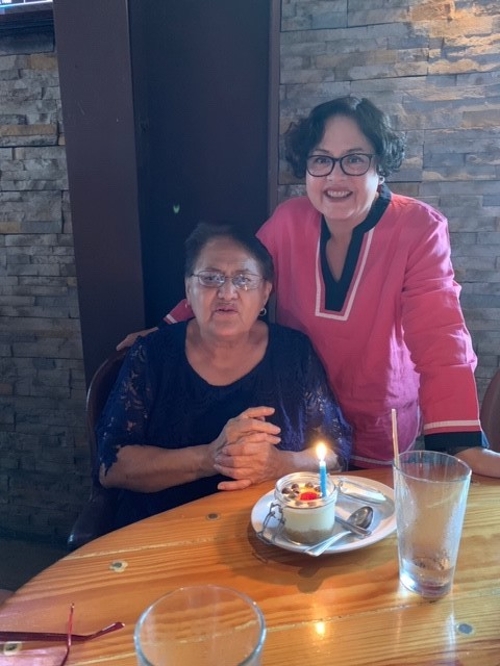
What are your hobbies?
I love the outdoors and enjoy working on needed tasks in our family ranch. Our property is approximately 32 miles northwest of TAMIU. In my spare time, I love to tend to my plants, our garden and ride my horse, Guzanito. I take nature walks, which are very soothing and relaxing. Guzanito is a very kind and gentle horse and he is easy to ride which is perfect for me because I am an amateur rider.
Who has been your greatest inspiration and why?
My greatest inspiration has been my mother, Bertha R. Lozano. She not only gave me life but also continues to nourish it with all her consejos (advice) and daily prayers. She has taught me to persevere and never give up on any of my goals. I believe she embodies many important character-forming traits. Although she completed teaching and social worker degrees in México while working full-time, when she got married to my father and immigrated to the United States, she did not continue working in her fields of study. Instead, she dedicated her whole life to taking care of her six children. Her determination and constant consejos are part of my moral compass. She often reminds me that I can accomplish anything that I set my mind to do by telling me the following words: “Tú nunca le has tenido miedo a los retos. Nunca te has dejado vencer. Tú puedes.” These consejos translate into you have never been afraid of challenges and you have never given up. You can do it!
Please share your proudest accomplishment to date.
My greatest accomplishment has to be becoming a mother to our only son, Amable Antonio Viloria, Jr., who has been with me every single step of my Ph.D. journey. He was my classmate in all of my TTVN classes. Instead of playing with his friends, he had to attend Ph.D.-level classes with me since he was 12. I guess he did not have a choice and instead had to mature quickly. Recently, he completed his post-secondary education at St. Edwards University and is now working in Austin. He has taught me to “accentuate the positive and eliminate the negative”. Additionally, at a professional level, my greatest accomplishments are first completing my Ph.D. in 2013, being able to work at TAMIU, and being granted tenure and promotion by my TAMIU colleagues in 2020.
Tell us what you're doing today academically, career of life-wise and what your future plans are.
Presently, I have several academic projects that I am working on. My research interest has evolved to place-based educational leadership and local agency as a means to preserve diversity and foster educational equity in both rural and non-rural schools.
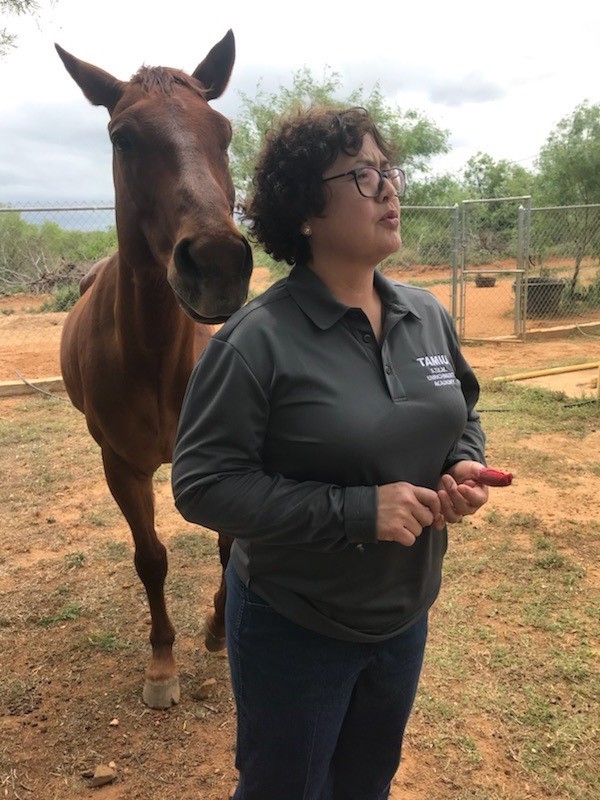
As previously mentioned, my primary goal is to prepare educational leaders who are equipped with research-based, culturally responsive leadership practices and STEM-based knowledge to lead in public school systems. To that end, I have six, sole-author publications, four publications with TAMIU graduate students, and seven publications with colleagues from diverse academic disciplines.
I have collaborated and written several grants at the state and federal levels. The USDA-NIFA grant focuses on rural school districts' STEM teachers' professional development. The research-based instructional strategies employed engage teachers and students with their immediate ecological contexts via instructional strategies aligned to curriculum standards centered on agricultural mathematics, science and technology knowledge and skills, specific needs of English language learners and indigenous, authentic agricultural topics through field-based experiences.
Recently, my colleague, Dr. Won Kim and I collaborated on a University Research Grant entitled, “Special Education Leadership Preparation: Are Principals' Prepared for Issues in Special Education?,” which was funded in 2020. Although COVID-19 has affected our data collection, we hope to collect data pertaining to special education leadership preparation.
Our hope is that our findings will inform school districts' special education services and help school districts design a special education leadership professional development program. Above all, in my professional career and personal development, I have always enjoyed giving back to my organization. I serve as faculty senator vice-president, chair of the University Technology Committee, and Educational Administration Program coordinator and advisor, and College of Education UCC representative.
My plans are to begin preparing for my academic life post the promotion and tenure review process. In fact, I plan to pursue my research agenda by writing a book and I would love to be a Fulbright Scholar in the near future.
What are some of the aspects of your culture or tradition that you celebrate or appreciate the most and how meaningful are they to you?
Most definitely, the most celebrated Mexican-American traditions are honoring our families and the traditional foods. I have six brothers and two sisters. My father had three sons in his previous marriage. In my immediate family, I am the eldest of and the first to graduate from college. I attended the University of Texas at Austin for my undergraduate degree and all my brothers and sisters followed. All of us, with the exception of one of my brothers, graduated from UT. My oldest brother served in the United States Air Force and he recently retired as a Colonel after 30 years of service to our nation. I have a sister who is a dentist, one who is an attorney and two of my brothers work for the Department of Homeland Security as special agents and one has his own business in San Antonio and another brother works in the international trade business in Laredo. Since I am the oldest sister and my mother cannot make the Christmas tamales anymore, two years ago, I decided that I would make the traditional tamales for all my siblings. Therefore, every December, my mother and my sister, who lives in Laredo, gather at my house to make close to 60 dozen tamales. I prepare all the ingredients (masa, meat, beans chicken) before so all my mother has to do is supervise my sister and I carrying on this cherished Mexican tradition. Thus far, it has been fun and I hope to continue this beautiful tradition for as long as I can.
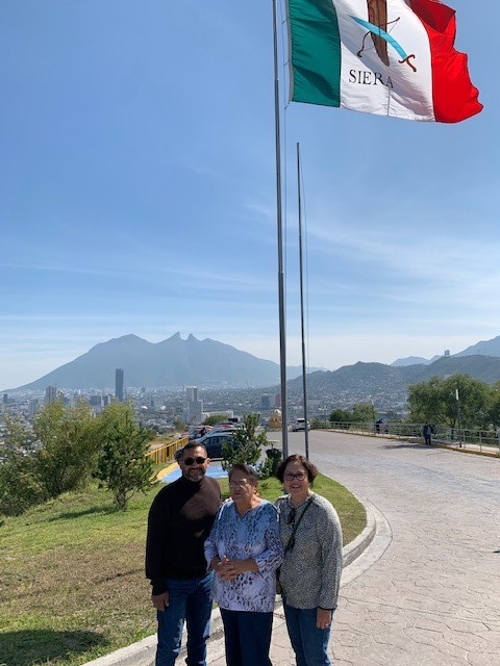
In your opinion, what are some of the notable contributions by people in the culture or traditions that you represent?
Nationwide, Mexican-Americans have made multiple contributions in science, politics, sports and entertainment fields. However, Mexican-Americans, like most people of color, have experienced overt and covert discrimination. Personally, I do not believe that we can talk about notable contributions without an appreciation and understanding of the challenges that Mexican American people have experienced and overcome. The history of Mexican-Americans begins with the annexation of land that had previously belonged to Mexico (Arizona, California, Colorado, Nevada, Utah, New Mexico, and Wyoming) when the Treaty of Guadalupe Hidalgo was signed in 1848 by the United States and México. Texas joined the United States in 1845 when the Texas Republic (1836-1845) was not able to defend itself from Mexican troops, so Mexican-Americans have more than 400 years of history in the United States.
Against the odds, there have been several firsts in the Mexican-American community. For example, in 1940, Mexican- American attorneys Gus García and Carlos Cadena presided over an anti-discrimination case in South Texas involving Pauline Rosa who was a Mexican-American resident of Edna, Texas. At issue was that although Latinos were legally considered “white,” they met with discrimination in Texas public schools. Consequently, in Hernández v. Texas (1954), attorneys García and Cadena successfully won this civil rights case followed a second civil right victory in 1948, which declared school segregation of Mexican-Americans illegal. Carlos Cadena, who helped found the Mexican-American Legal Defense and Educational Fund, became the first Mexican-American chief justice in Texas in 1977.
Mexican-American women in politics have also made important historical leaps. For example, in 2011, President Barack Obama nominated Judge Diana S. Saldaña to the United States District Court for the Southern District of Texas and the United States Senate confirmed her nomination. In 2011, in New Mexico, Susana Martínez was elected for governor. She became the first female governor of New Mexico and first Hispanic governor in the United States.
According to the Pew Research Center (2019), people of Mexican origin account for 62% of the United States population. Sadly, in 2017, only 16% of Mexican-Americans held a bachelor's degree (Pew Center, 2019). With this in mind, I believe that TAMIU leads the way in changing Mexican-American students' academic hopes and dreams. To that point, TAMIU was ranked as the second highest ranked Texas public university, Best Regional Universities West by U.S. News and World Report (2020) and that is how TAMIU is leading and making historical marks.
How do you think they can continue to increase their visibility and impact here and in the world?
There are numerous opportunities to make a positive mark in our global society. Presently, I believe that young people of color have numerous opportunities to improve their personal lives and make important contributions to their immediate communities and society. The current political and economic uncertainties should be more reasons to focus on preparing for the future. What I mean is that individuals who have the authority and educational knowledge to have a seat at the table make important decisions in boardrooms behind closed doors. Therefore, if students of color, including Mexican American students intend and envision to make a mark and make an impact in the world, they must be academically prepared to do so. The first step is to focus on their academic trajectory, ask questions of their professors, seek mentorships and internships and not be afraid to fail. I believe that mistakes are learning opportunities.
Is diversity important at university campuses, in the workplace and overall? Why?
Recently, the Chronicle of Higher Education ranked TAMIU as eighth among colleges with the greatest racial and ethnic faculty diversity. I believe that my daily life is surrounded by multicultural experiences because we need to appreciate every person who is around us and is part of our daily life.
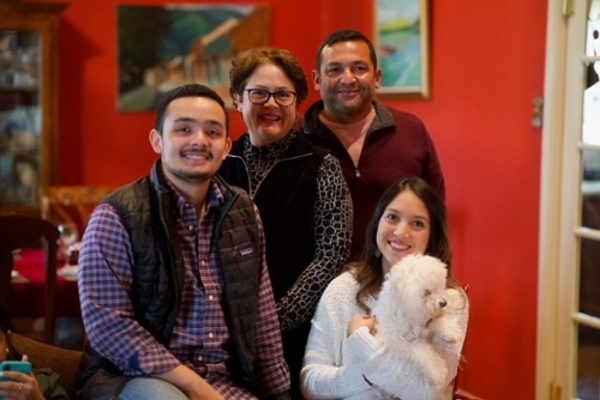
Personally, I have had multicultural experiences during my college life. My first roommate at UT was from South Carolina. My husband is from Venezuela and some of his family members still reside in Venezuela. I have a sister-in-law whose parents are from Holland. I also have a brother-in-law who is from Spain. I have traveled to México, Spain, China and Venezuela and 15 different states. As mentioned above, in my own trajectory through higher education, I have navigated and endured discriminatory institutional practices.
I believe it is my responsibility to share my experiences with future generations of Hispanic students. For example, as a first-generation college student, I did not know how to handle overt discrimination because Laredo is 99% Hispanic. I remember that in fourth grade, my teacher taught us about the Civil Rights Act of 1964, which prohibited discrimination based on race, color, religion, sex, or national origin in voting, public accommodations, public facilities, public education, federally funded programs, and employment.
At the time, I did not feel affected by this legislation, as these segregationist practices were framed as eradicated. However, I now recognize that as educators of students of color, we do a disservice to them if we simply regurgitate these words as a lesson in history without an understanding of how discrimination happens institutionally and interpersonally.
Students of color also deserve to be equipped with a skill set from which to defend against discriminatory practices. Therefore, I believe that diversity is important but it is more important to equip diverse student populations with problem-solving skills and the academic knowledge to be able to have a seat at the table in board rooms and institutional committees where their voices can have a direct and positive influence in the decision-making process.
